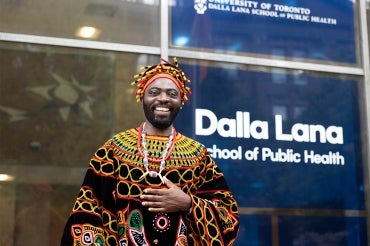From selling peanuts to saving lives: Researcher uses AI to combat health misinformation across Africa

Jude Kong, an assistant professor at U of T’s Dalla Lana School of Public health with a cross appointment in mathematics, is collaborating with communities, governments and university researchers across 21 countries (photo by Lisa Lightbourn)
Published: July 15, 2025
At age 15 – a time when most teenagers are enjoying after-school activities and hanging out with their friends – Jude Kong was selling peanuts on the street in Cameroon.
He grew up in a village called Shiy, about a 10-hour drive north of the capital, Yaoundé. The nearest hospital was a four-hour trek away, and since only a few locals owned cars, it wasn’t uncommon for residents to carry the sick there on their backs.
That’s exactly what Kong and his mother did when his aunt fell seriously ill.
“My mom and I, struggling to carry her – I was very young – we were carrying my aunt to the hospital and she passed away,” says Kong, now an assistant professor at the University of Toronto’s Dalla Lana School of Public Health who is cross-appointed to the department of mathematics in the Faculty of Arts & Science.
He says his aunt’s death – likely due to malaria, one of the most pressing health challenges in his community – was a pivotal moment that ultimately shaped his career. Drawing on his education in applied mathematics and engineering, which he earned in Cameroon, Italy, Germany and Canada, Kong is now using artificial intelligence and other digital technologies to help solve public health challenges in Cameroon and across the Global South.
This includes combatting the spread of health misinformation – whether online, by word of mouth or through social media – and doing so in ways that respect local and cultural perspectives.
In early 2020, Kong brought together a group of like-minded researchers to form the Africa Canada-Artificial Intelligence & Data Innovation Consortium (ACADIC). The team sought to mobilize AI to boost preparedness for pandemics and climate disasters in a way that is both equitable and resilient. That included designing AI models to counter malaria-related myths and misinformation by educating community members about the life-threatening illness.
When COVID-19 struck, the consortium quickly pivoted.
“How do we build ways to address misinformation? How do we tell the community where the hotspots are? Given what they're telling us, how do we tell them when to expect the next outbreak in the community? What’s causing the deaths?”
Kong and his team used AI models to create early detection systems for COVID-19, which helped predict daily case counts and provided other key insights. Meanwhile, it has launched tools such as DigiCARE to help detect and predict cholera and malaria outbreaks in Cameroon.
Dickson Nsagha, dean of the Faculty of Health Sciences at the University of Buea and director of the Cameroon branch of the Global South AI for Pandemic & Epidemic Preparedness & Response Network (AI4PEP), which Kong also founded, says the tools “deliver situational intelligence on populations at risk, the stages of outbreaks and projected disease burden down to the village level – information that is critical for timely and effective interventions.”
He adds that the AI-powered tools developed by Kong and his team are also empowering local governments to take a more proactive approach to disease monitoring and helping communities build a stronger future.
“By uniting AI innovation with local knowledge, we are creating a health-care revolution that is sustainable, inclusive and deeply rooted in the needs of Cameroon’s people.”
Growing up, Kong assumed his education would end after primary school, where he often helped classmates with their math homework.
“I would cultivate peanuts and then after school … just run from car to car selling that peanut,” he says. “Then the whole community reached out to my mom and said, ‘Let's do everything to send this kid to secondary school.’”
After graduating from high school with several scholarships, he went on to study in Europe and North America. He arrived at U of T last year after holding faculty positions in mathematics, engineering and public health at York University.
Through ACADIC and AI4PEP, Kong’s work has attracted funding from major international agencies such as the International Development Research Centre in Canada and the Foreign, Commonwealth & Development Office in the United Kingdom and the Swedish Development Cooperation Agency.
Kong and his team are currently developing AI models to help address public health challenges in countries across the Global South. Examples include: the South African Consortium of Air Quality Monitoring, the PolioAntenna mobile app, which collects and analyzes real-time data for polio detection and management in Ethiopia, and the RAPID-VBP project in Ghana, which uses bio-acoustic sensors and climate-driven predictive models for early detection and prediction of vector-borne diseases.
In total, Kong says he’s now collaborating with communities, governments and researchers from universities across 21 countries in the Global South, leveraging AI and mathematical modelling to strengthen health-care systems with a community-centred approach.
The goal, he says, is to ensure the work continues by “building capacity and then training the people to continue training others in the future.”
With support from Global Affairs Canada’s Canadian International Development Scholarships 2030 (BCDI 2030), Kong also brings PhD students from Africa into his U of T lab to help design AI solutions for their home communities. Starting next year, he hopes to do something similar with U of T students from diverse communities across the Greater Toronto Area.
Why does he think his technology-focused approach to public health has been so successful?
“We are creating with the communities,” he says. “If you co-create it with them and ensure that it's locally relevant … they will adopt it.”
Read more about Jude Kong in Newsweek



